Empowering Patients: Role of Family in Mental Health Rehabilitation
VerifiedAdded on 2023/06/11
|12
|3301
|500
Essay
AI Summary
This essay critically evaluates the role of family in mental health rehabilitation and assesses the effectiveness of family involvement in empowering mentally ill patients. It highlights the importance of psychosocial rehabilitation (PSR) in promoting personal recovery and improving the quality of life for individuals with mental illnesses. The essay discusses how PSR, with its patient-oriented and collaborative approach, addresses the challenges faced by mentally ill individuals, including difficulties in daily functioning and social interactions. It emphasizes the shift from viewing families as a cause of mental illness to recognizing them as crucial partners in the rehabilitation process. The essay also explores the benefits of family involvement, such as increased patient commitment to treatment, reduced relapse rates, and improved coping skills for both patients and families. Furthermore, it addresses potential barriers to family engagement and suggests strategies to overcome them, including enhancing communication skills of healthcare professionals and implementing evidence-based practices like psycho-education and skills training. The essay concludes by underscoring the importance of integrating family perspectives and collaborative approaches in mental health care to promote patient recovery and overall well-being.
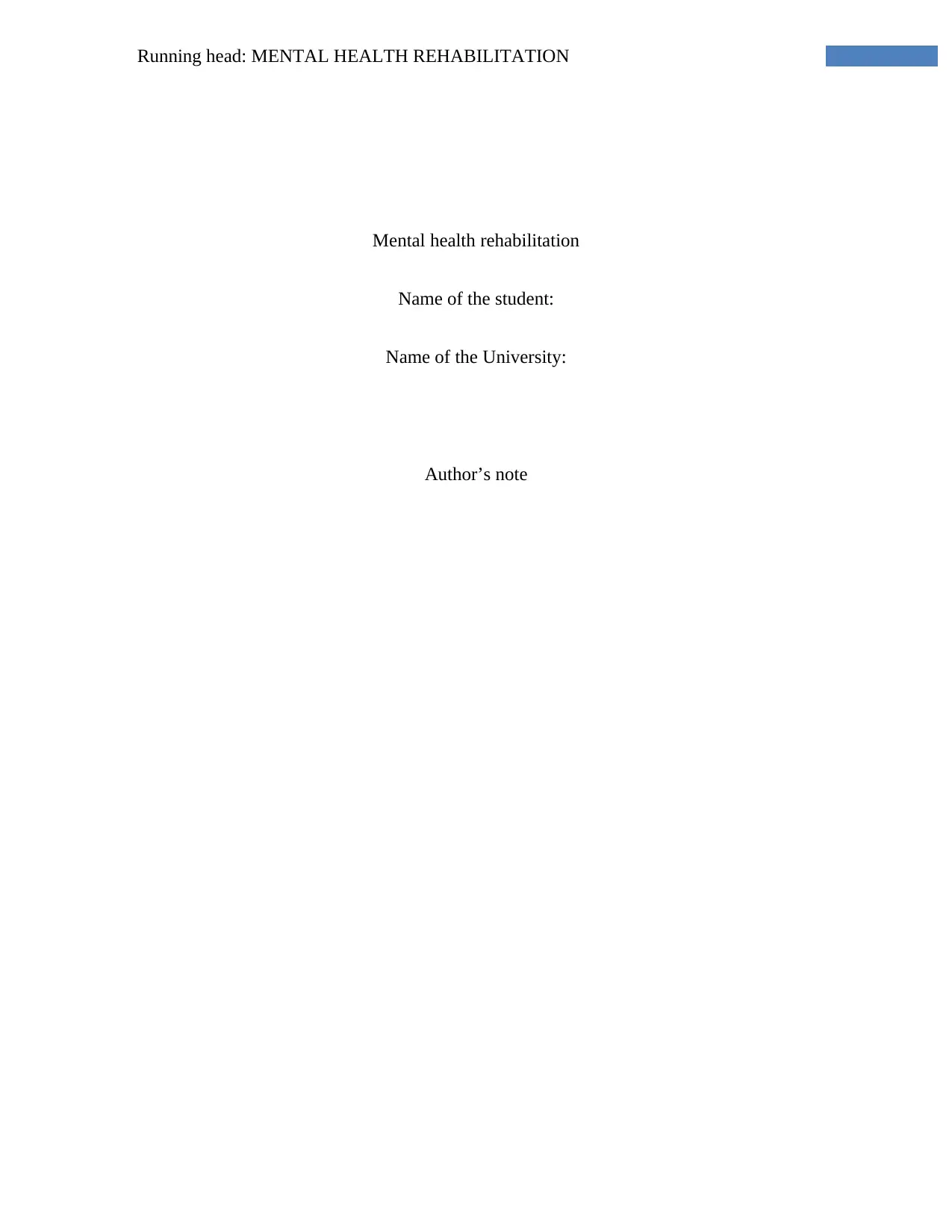
Running head: MENTAL HEALTH REHABILITATION
Mental health rehabilitation
Name of the student:
Name of the University:
Author’s note
Mental health rehabilitation
Name of the student:
Name of the University:
Author’s note
Paraphrase This Document
Need a fresh take? Get an instant paraphrase of this document with our AI Paraphraser
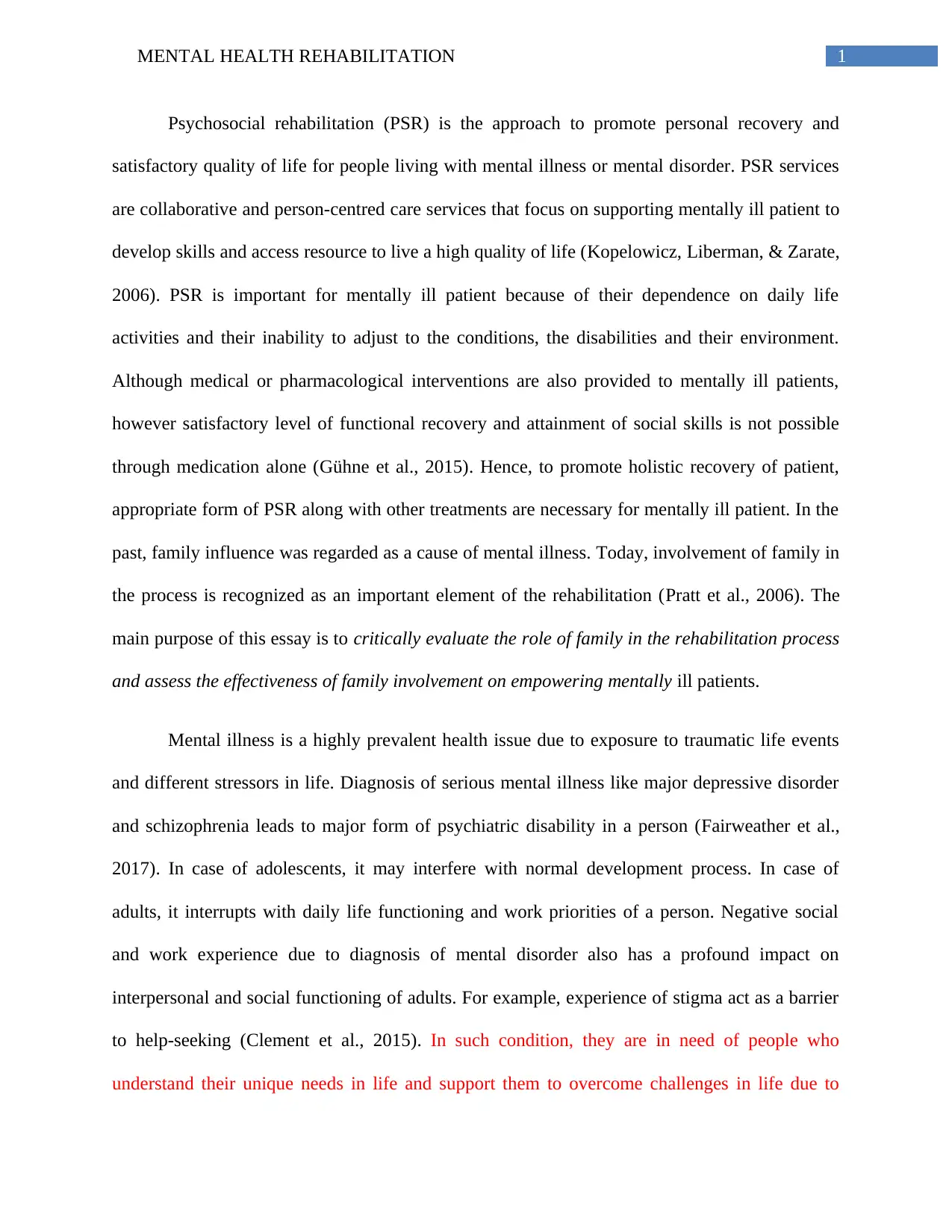
1MENTAL HEALTH REHABILITATION
Psychosocial rehabilitation (PSR) is the approach to promote personal recovery and
satisfactory quality of life for people living with mental illness or mental disorder. PSR services
are collaborative and person-centred care services that focus on supporting mentally ill patient to
develop skills and access resource to live a high quality of life (Kopelowicz, Liberman, & Zarate,
2006). PSR is important for mentally ill patient because of their dependence on daily life
activities and their inability to adjust to the conditions, the disabilities and their environment.
Although medical or pharmacological interventions are also provided to mentally ill patients,
however satisfactory level of functional recovery and attainment of social skills is not possible
through medication alone (Gühne et al., 2015). Hence, to promote holistic recovery of patient,
appropriate form of PSR along with other treatments are necessary for mentally ill patient. In the
past, family influence was regarded as a cause of mental illness. Today, involvement of family in
the process is recognized as an important element of the rehabilitation (Pratt et al., 2006). The
main purpose of this essay is to critically evaluate the role of family in the rehabilitation process
and assess the effectiveness of family involvement on empowering mentally ill patients.
Mental illness is a highly prevalent health issue due to exposure to traumatic life events
and different stressors in life. Diagnosis of serious mental illness like major depressive disorder
and schizophrenia leads to major form of psychiatric disability in a person (Fairweather et al.,
2017). In case of adolescents, it may interfere with normal development process. In case of
adults, it interrupts with daily life functioning and work priorities of a person. Negative social
and work experience due to diagnosis of mental disorder also has a profound impact on
interpersonal and social functioning of adults. For example, experience of stigma act as a barrier
to help-seeking (Clement et al., 2015). In such condition, they are in need of people who
understand their unique needs in life and support them to overcome challenges in life due to
Psychosocial rehabilitation (PSR) is the approach to promote personal recovery and
satisfactory quality of life for people living with mental illness or mental disorder. PSR services
are collaborative and person-centred care services that focus on supporting mentally ill patient to
develop skills and access resource to live a high quality of life (Kopelowicz, Liberman, & Zarate,
2006). PSR is important for mentally ill patient because of their dependence on daily life
activities and their inability to adjust to the conditions, the disabilities and their environment.
Although medical or pharmacological interventions are also provided to mentally ill patients,
however satisfactory level of functional recovery and attainment of social skills is not possible
through medication alone (Gühne et al., 2015). Hence, to promote holistic recovery of patient,
appropriate form of PSR along with other treatments are necessary for mentally ill patient. In the
past, family influence was regarded as a cause of mental illness. Today, involvement of family in
the process is recognized as an important element of the rehabilitation (Pratt et al., 2006). The
main purpose of this essay is to critically evaluate the role of family in the rehabilitation process
and assess the effectiveness of family involvement on empowering mentally ill patients.
Mental illness is a highly prevalent health issue due to exposure to traumatic life events
and different stressors in life. Diagnosis of serious mental illness like major depressive disorder
and schizophrenia leads to major form of psychiatric disability in a person (Fairweather et al.,
2017). In case of adolescents, it may interfere with normal development process. In case of
adults, it interrupts with daily life functioning and work priorities of a person. Negative social
and work experience due to diagnosis of mental disorder also has a profound impact on
interpersonal and social functioning of adults. For example, experience of stigma act as a barrier
to help-seeking (Clement et al., 2015). In such condition, they are in need of people who
understand their unique needs in life and support them to overcome challenges in life due to
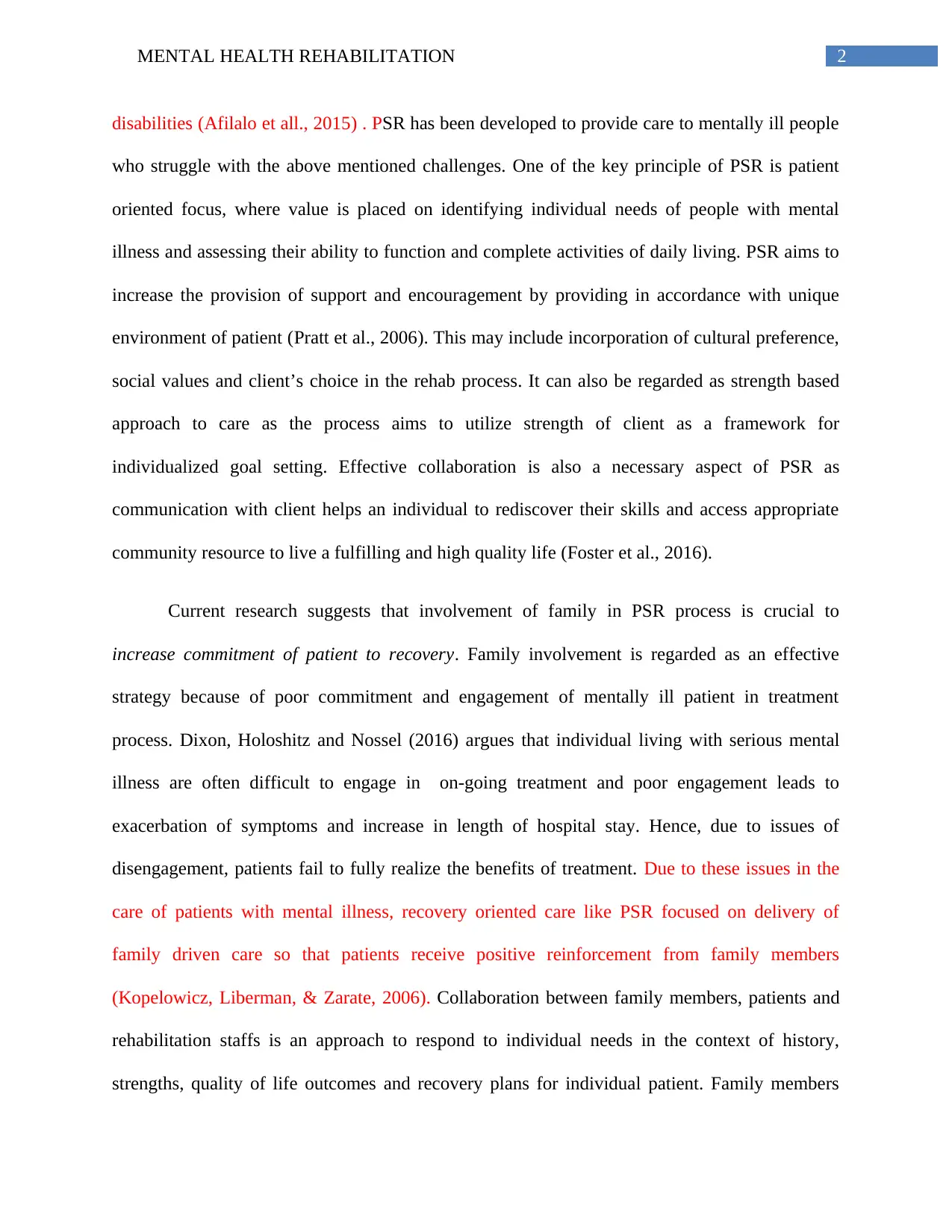
2MENTAL HEALTH REHABILITATION
disabilities (Afilalo et all., 2015) . PSR has been developed to provide care to mentally ill people
who struggle with the above mentioned challenges. One of the key principle of PSR is patient
oriented focus, where value is placed on identifying individual needs of people with mental
illness and assessing their ability to function and complete activities of daily living. PSR aims to
increase the provision of support and encouragement by providing in accordance with unique
environment of patient (Pratt et al., 2006). This may include incorporation of cultural preference,
social values and client’s choice in the rehab process. It can also be regarded as strength based
approach to care as the process aims to utilize strength of client as a framework for
individualized goal setting. Effective collaboration is also a necessary aspect of PSR as
communication with client helps an individual to rediscover their skills and access appropriate
community resource to live a fulfilling and high quality life (Foster et al., 2016).
Current research suggests that involvement of family in PSR process is crucial to
increase commitment of patient to recovery. Family involvement is regarded as an effective
strategy because of poor commitment and engagement of mentally ill patient in treatment
process. Dixon, Holoshitz and Nossel (2016) argues that individual living with serious mental
illness are often difficult to engage in on-going treatment and poor engagement leads to
exacerbation of symptoms and increase in length of hospital stay. Hence, due to issues of
disengagement, patients fail to fully realize the benefits of treatment. Due to these issues in the
care of patients with mental illness, recovery oriented care like PSR focused on delivery of
family driven care so that patients receive positive reinforcement from family members
(Kopelowicz, Liberman, & Zarate, 2006). Collaboration between family members, patients and
rehabilitation staffs is an approach to respond to individual needs in the context of history,
strengths, quality of life outcomes and recovery plans for individual patient. Family members
disabilities (Afilalo et all., 2015) . PSR has been developed to provide care to mentally ill people
who struggle with the above mentioned challenges. One of the key principle of PSR is patient
oriented focus, where value is placed on identifying individual needs of people with mental
illness and assessing their ability to function and complete activities of daily living. PSR aims to
increase the provision of support and encouragement by providing in accordance with unique
environment of patient (Pratt et al., 2006). This may include incorporation of cultural preference,
social values and client’s choice in the rehab process. It can also be regarded as strength based
approach to care as the process aims to utilize strength of client as a framework for
individualized goal setting. Effective collaboration is also a necessary aspect of PSR as
communication with client helps an individual to rediscover their skills and access appropriate
community resource to live a fulfilling and high quality life (Foster et al., 2016).
Current research suggests that involvement of family in PSR process is crucial to
increase commitment of patient to recovery. Family involvement is regarded as an effective
strategy because of poor commitment and engagement of mentally ill patient in treatment
process. Dixon, Holoshitz and Nossel (2016) argues that individual living with serious mental
illness are often difficult to engage in on-going treatment and poor engagement leads to
exacerbation of symptoms and increase in length of hospital stay. Hence, due to issues of
disengagement, patients fail to fully realize the benefits of treatment. Due to these issues in the
care of patients with mental illness, recovery oriented care like PSR focused on delivery of
family driven care so that patients receive positive reinforcement from family members
(Kopelowicz, Liberman, & Zarate, 2006). Collaboration between family members, patients and
rehabilitation staffs is an approach to respond to individual needs in the context of history,
strengths, quality of life outcomes and recovery plans for individual patient. Family members
⊘ This is a preview!⊘
Do you want full access?
Subscribe today to unlock all pages.

Trusted by 1+ million students worldwide
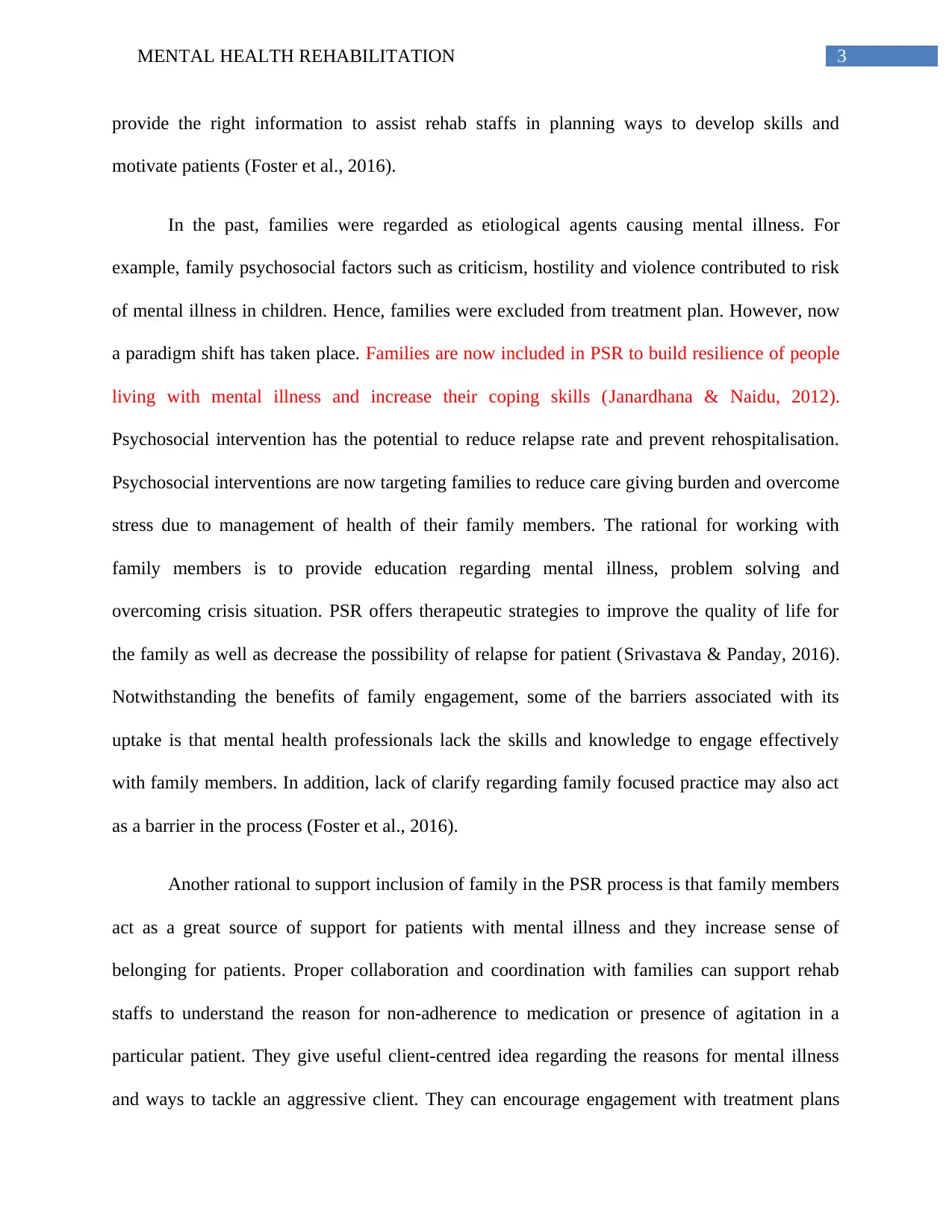
3MENTAL HEALTH REHABILITATION
provide the right information to assist rehab staffs in planning ways to develop skills and
motivate patients (Foster et al., 2016).
In the past, families were regarded as etiological agents causing mental illness. For
example, family psychosocial factors such as criticism, hostility and violence contributed to risk
of mental illness in children. Hence, families were excluded from treatment plan. However, now
a paradigm shift has taken place. Families are now included in PSR to build resilience of people
living with mental illness and increase their coping skills (Janardhana & Naidu, 2012).
Psychosocial intervention has the potential to reduce relapse rate and prevent rehospitalisation.
Psychosocial interventions are now targeting families to reduce care giving burden and overcome
stress due to management of health of their family members. The rational for working with
family members is to provide education regarding mental illness, problem solving and
overcoming crisis situation. PSR offers therapeutic strategies to improve the quality of life for
the family as well as decrease the possibility of relapse for patient (Srivastava & Panday, 2016).
Notwithstanding the benefits of family engagement, some of the barriers associated with its
uptake is that mental health professionals lack the skills and knowledge to engage effectively
with family members. In addition, lack of clarify regarding family focused practice may also act
as a barrier in the process (Foster et al., 2016).
Another rational to support inclusion of family in the PSR process is that family members
act as a great source of support for patients with mental illness and they increase sense of
belonging for patients. Proper collaboration and coordination with families can support rehab
staffs to understand the reason for non-adherence to medication or presence of agitation in a
particular patient. They give useful client-centred idea regarding the reasons for mental illness
and ways to tackle an aggressive client. They can encourage engagement with treatment plans
provide the right information to assist rehab staffs in planning ways to develop skills and
motivate patients (Foster et al., 2016).
In the past, families were regarded as etiological agents causing mental illness. For
example, family psychosocial factors such as criticism, hostility and violence contributed to risk
of mental illness in children. Hence, families were excluded from treatment plan. However, now
a paradigm shift has taken place. Families are now included in PSR to build resilience of people
living with mental illness and increase their coping skills (Janardhana & Naidu, 2012).
Psychosocial intervention has the potential to reduce relapse rate and prevent rehospitalisation.
Psychosocial interventions are now targeting families to reduce care giving burden and overcome
stress due to management of health of their family members. The rational for working with
family members is to provide education regarding mental illness, problem solving and
overcoming crisis situation. PSR offers therapeutic strategies to improve the quality of life for
the family as well as decrease the possibility of relapse for patient (Srivastava & Panday, 2016).
Notwithstanding the benefits of family engagement, some of the barriers associated with its
uptake is that mental health professionals lack the skills and knowledge to engage effectively
with family members. In addition, lack of clarify regarding family focused practice may also act
as a barrier in the process (Foster et al., 2016).
Another rational to support inclusion of family in the PSR process is that family members
act as a great source of support for patients with mental illness and they increase sense of
belonging for patients. Proper collaboration and coordination with families can support rehab
staffs to understand the reason for non-adherence to medication or presence of agitation in a
particular patient. They give useful client-centred idea regarding the reasons for mental illness
and ways to tackle an aggressive client. They can encourage engagement with treatment plans
Paraphrase This Document
Need a fresh take? Get an instant paraphrase of this document with our AI Paraphraser
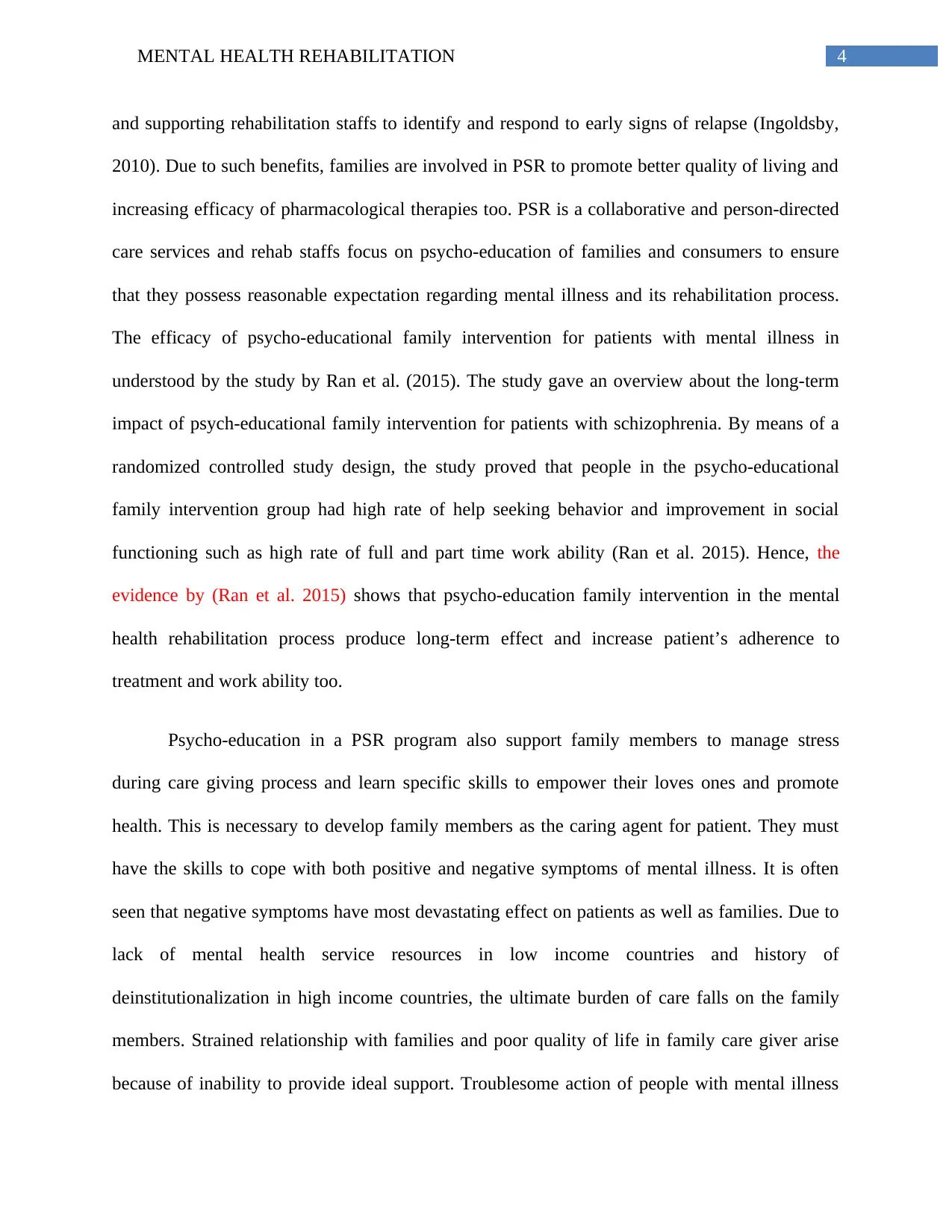
4MENTAL HEALTH REHABILITATION
and supporting rehabilitation staffs to identify and respond to early signs of relapse (Ingoldsby,
2010). Due to such benefits, families are involved in PSR to promote better quality of living and
increasing efficacy of pharmacological therapies too. PSR is a collaborative and person-directed
care services and rehab staffs focus on psycho-education of families and consumers to ensure
that they possess reasonable expectation regarding mental illness and its rehabilitation process.
The efficacy of psycho-educational family intervention for patients with mental illness in
understood by the study by Ran et al. (2015). The study gave an overview about the long-term
impact of psych-educational family intervention for patients with schizophrenia. By means of a
randomized controlled study design, the study proved that people in the psycho-educational
family intervention group had high rate of help seeking behavior and improvement in social
functioning such as high rate of full and part time work ability (Ran et al. 2015). Hence, the
evidence by (Ran et al. 2015) shows that psycho-education family intervention in the mental
health rehabilitation process produce long-term effect and increase patient’s adherence to
treatment and work ability too.
Psycho-education in a PSR program also support family members to manage stress
during care giving process and learn specific skills to empower their loves ones and promote
health. This is necessary to develop family members as the caring agent for patient. They must
have the skills to cope with both positive and negative symptoms of mental illness. It is often
seen that negative symptoms have most devastating effect on patients as well as families. Due to
lack of mental health service resources in low income countries and history of
deinstitutionalization in high income countries, the ultimate burden of care falls on the family
members. Strained relationship with families and poor quality of life in family care giver arise
because of inability to provide ideal support. Troublesome action of people with mental illness
and supporting rehabilitation staffs to identify and respond to early signs of relapse (Ingoldsby,
2010). Due to such benefits, families are involved in PSR to promote better quality of living and
increasing efficacy of pharmacological therapies too. PSR is a collaborative and person-directed
care services and rehab staffs focus on psycho-education of families and consumers to ensure
that they possess reasonable expectation regarding mental illness and its rehabilitation process.
The efficacy of psycho-educational family intervention for patients with mental illness in
understood by the study by Ran et al. (2015). The study gave an overview about the long-term
impact of psych-educational family intervention for patients with schizophrenia. By means of a
randomized controlled study design, the study proved that people in the psycho-educational
family intervention group had high rate of help seeking behavior and improvement in social
functioning such as high rate of full and part time work ability (Ran et al. 2015). Hence, the
evidence by (Ran et al. 2015) shows that psycho-education family intervention in the mental
health rehabilitation process produce long-term effect and increase patient’s adherence to
treatment and work ability too.
Psycho-education in a PSR program also support family members to manage stress
during care giving process and learn specific skills to empower their loves ones and promote
health. This is necessary to develop family members as the caring agent for patient. They must
have the skills to cope with both positive and negative symptoms of mental illness. It is often
seen that negative symptoms have most devastating effect on patients as well as families. Due to
lack of mental health service resources in low income countries and history of
deinstitutionalization in high income countries, the ultimate burden of care falls on the family
members. Strained relationship with families and poor quality of life in family care giver arise
because of inability to provide ideal support. Troublesome action of people with mental illness
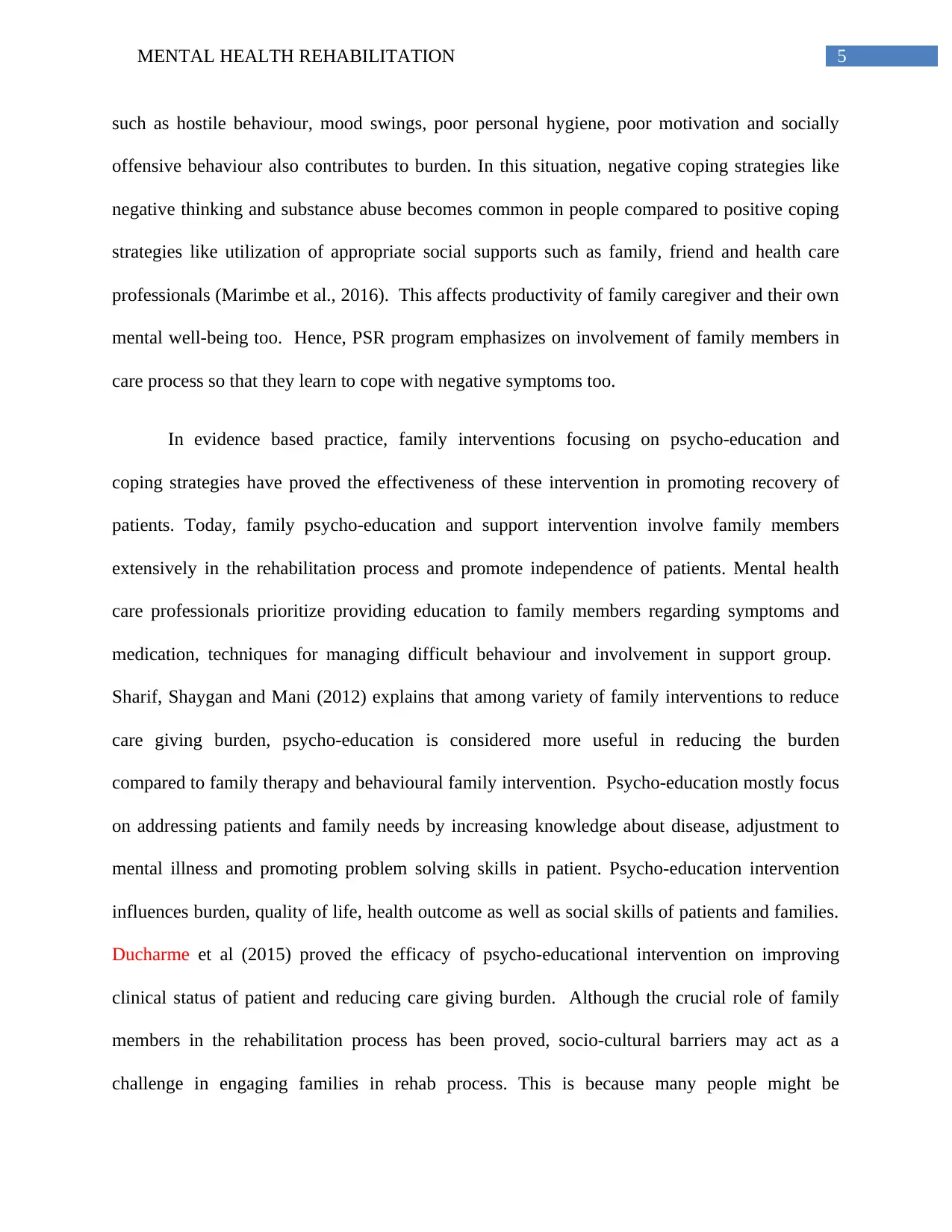
5MENTAL HEALTH REHABILITATION
such as hostile behaviour, mood swings, poor personal hygiene, poor motivation and socially
offensive behaviour also contributes to burden. In this situation, negative coping strategies like
negative thinking and substance abuse becomes common in people compared to positive coping
strategies like utilization of appropriate social supports such as family, friend and health care
professionals (Marimbe et al., 2016). This affects productivity of family caregiver and their own
mental well-being too. Hence, PSR program emphasizes on involvement of family members in
care process so that they learn to cope with negative symptoms too.
In evidence based practice, family interventions focusing on psycho-education and
coping strategies have proved the effectiveness of these intervention in promoting recovery of
patients. Today, family psycho-education and support intervention involve family members
extensively in the rehabilitation process and promote independence of patients. Mental health
care professionals prioritize providing education to family members regarding symptoms and
medication, techniques for managing difficult behaviour and involvement in support group.
Sharif, Shaygan and Mani (2012) explains that among variety of family interventions to reduce
care giving burden, psycho-education is considered more useful in reducing the burden
compared to family therapy and behavioural family intervention. Psycho-education mostly focus
on addressing patients and family needs by increasing knowledge about disease, adjustment to
mental illness and promoting problem solving skills in patient. Psycho-education intervention
influences burden, quality of life, health outcome as well as social skills of patients and families.
Ducharme et al (2015) proved the efficacy of psycho-educational intervention on improving
clinical status of patient and reducing care giving burden. Although the crucial role of family
members in the rehabilitation process has been proved, socio-cultural barriers may act as a
challenge in engaging families in rehab process. This is because many people might be
such as hostile behaviour, mood swings, poor personal hygiene, poor motivation and socially
offensive behaviour also contributes to burden. In this situation, negative coping strategies like
negative thinking and substance abuse becomes common in people compared to positive coping
strategies like utilization of appropriate social supports such as family, friend and health care
professionals (Marimbe et al., 2016). This affects productivity of family caregiver and their own
mental well-being too. Hence, PSR program emphasizes on involvement of family members in
care process so that they learn to cope with negative symptoms too.
In evidence based practice, family interventions focusing on psycho-education and
coping strategies have proved the effectiveness of these intervention in promoting recovery of
patients. Today, family psycho-education and support intervention involve family members
extensively in the rehabilitation process and promote independence of patients. Mental health
care professionals prioritize providing education to family members regarding symptoms and
medication, techniques for managing difficult behaviour and involvement in support group.
Sharif, Shaygan and Mani (2012) explains that among variety of family interventions to reduce
care giving burden, psycho-education is considered more useful in reducing the burden
compared to family therapy and behavioural family intervention. Psycho-education mostly focus
on addressing patients and family needs by increasing knowledge about disease, adjustment to
mental illness and promoting problem solving skills in patient. Psycho-education intervention
influences burden, quality of life, health outcome as well as social skills of patients and families.
Ducharme et al (2015) proved the efficacy of psycho-educational intervention on improving
clinical status of patient and reducing care giving burden. Although the crucial role of family
members in the rehabilitation process has been proved, socio-cultural barriers may act as a
challenge in engaging families in rehab process. This is because many people might be
⊘ This is a preview!⊘
Do you want full access?
Subscribe today to unlock all pages.

Trusted by 1+ million students worldwide
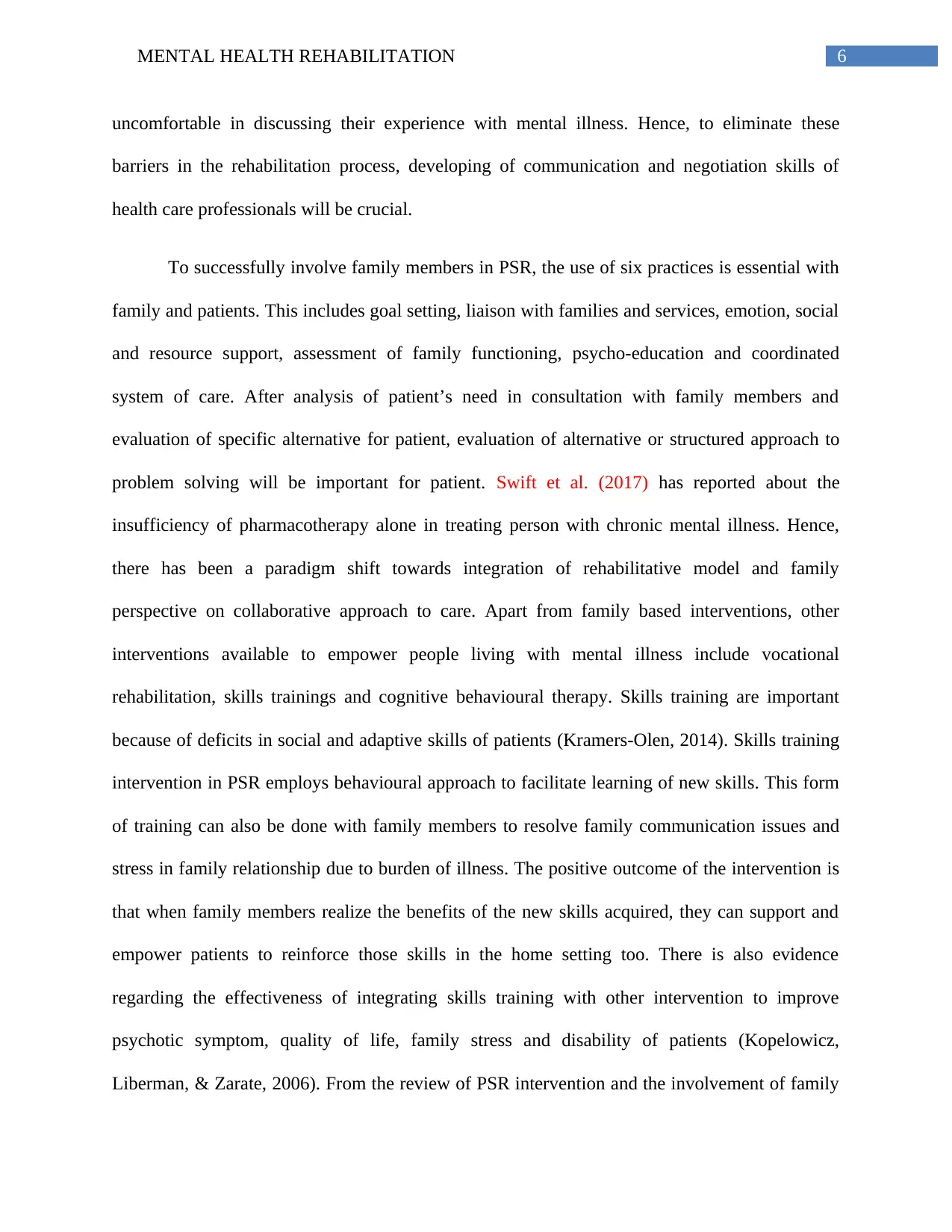
6MENTAL HEALTH REHABILITATION
uncomfortable in discussing their experience with mental illness. Hence, to eliminate these
barriers in the rehabilitation process, developing of communication and negotiation skills of
health care professionals will be crucial.
To successfully involve family members in PSR, the use of six practices is essential with
family and patients. This includes goal setting, liaison with families and services, emotion, social
and resource support, assessment of family functioning, psycho-education and coordinated
system of care. After analysis of patient’s need in consultation with family members and
evaluation of specific alternative for patient, evaluation of alternative or structured approach to
problem solving will be important for patient. Swift et al. (2017) has reported about the
insufficiency of pharmacotherapy alone in treating person with chronic mental illness. Hence,
there has been a paradigm shift towards integration of rehabilitative model and family
perspective on collaborative approach to care. Apart from family based interventions, other
interventions available to empower people living with mental illness include vocational
rehabilitation, skills trainings and cognitive behavioural therapy. Skills training are important
because of deficits in social and adaptive skills of patients (Kramers-Olen, 2014). Skills training
intervention in PSR employs behavioural approach to facilitate learning of new skills. This form
of training can also be done with family members to resolve family communication issues and
stress in family relationship due to burden of illness. The positive outcome of the intervention is
that when family members realize the benefits of the new skills acquired, they can support and
empower patients to reinforce those skills in the home setting too. There is also evidence
regarding the effectiveness of integrating skills training with other intervention to improve
psychotic symptom, quality of life, family stress and disability of patients (Kopelowicz,
Liberman, & Zarate, 2006). From the review of PSR intervention and the involvement of family
uncomfortable in discussing their experience with mental illness. Hence, to eliminate these
barriers in the rehabilitation process, developing of communication and negotiation skills of
health care professionals will be crucial.
To successfully involve family members in PSR, the use of six practices is essential with
family and patients. This includes goal setting, liaison with families and services, emotion, social
and resource support, assessment of family functioning, psycho-education and coordinated
system of care. After analysis of patient’s need in consultation with family members and
evaluation of specific alternative for patient, evaluation of alternative or structured approach to
problem solving will be important for patient. Swift et al. (2017) has reported about the
insufficiency of pharmacotherapy alone in treating person with chronic mental illness. Hence,
there has been a paradigm shift towards integration of rehabilitative model and family
perspective on collaborative approach to care. Apart from family based interventions, other
interventions available to empower people living with mental illness include vocational
rehabilitation, skills trainings and cognitive behavioural therapy. Skills training are important
because of deficits in social and adaptive skills of patients (Kramers-Olen, 2014). Skills training
intervention in PSR employs behavioural approach to facilitate learning of new skills. This form
of training can also be done with family members to resolve family communication issues and
stress in family relationship due to burden of illness. The positive outcome of the intervention is
that when family members realize the benefits of the new skills acquired, they can support and
empower patients to reinforce those skills in the home setting too. There is also evidence
regarding the effectiveness of integrating skills training with other intervention to improve
psychotic symptom, quality of life, family stress and disability of patients (Kopelowicz,
Liberman, & Zarate, 2006). From the review of PSR intervention and the involvement of family
Paraphrase This Document
Need a fresh take? Get an instant paraphrase of this document with our AI Paraphraser
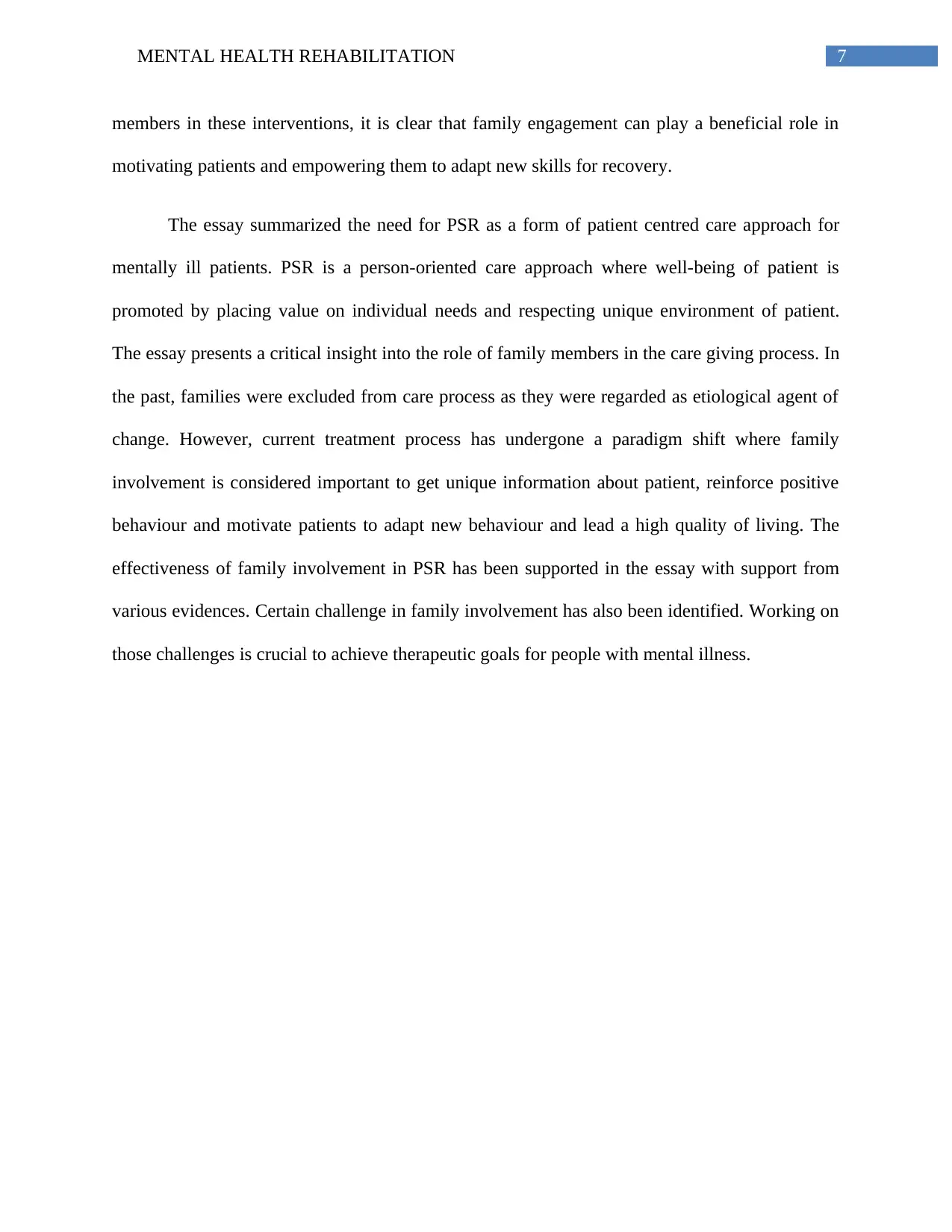
7MENTAL HEALTH REHABILITATION
members in these interventions, it is clear that family engagement can play a beneficial role in
motivating patients and empowering them to adapt new skills for recovery.
The essay summarized the need for PSR as a form of patient centred care approach for
mentally ill patients. PSR is a person-oriented care approach where well-being of patient is
promoted by placing value on individual needs and respecting unique environment of patient.
The essay presents a critical insight into the role of family members in the care giving process. In
the past, families were excluded from care process as they were regarded as etiological agent of
change. However, current treatment process has undergone a paradigm shift where family
involvement is considered important to get unique information about patient, reinforce positive
behaviour and motivate patients to adapt new behaviour and lead a high quality of living. The
effectiveness of family involvement in PSR has been supported in the essay with support from
various evidences. Certain challenge in family involvement has also been identified. Working on
those challenges is crucial to achieve therapeutic goals for people with mental illness.
members in these interventions, it is clear that family engagement can play a beneficial role in
motivating patients and empowering them to adapt new skills for recovery.
The essay summarized the need for PSR as a form of patient centred care approach for
mentally ill patients. PSR is a person-oriented care approach where well-being of patient is
promoted by placing value on individual needs and respecting unique environment of patient.
The essay presents a critical insight into the role of family members in the care giving process. In
the past, families were excluded from care process as they were regarded as etiological agent of
change. However, current treatment process has undergone a paradigm shift where family
involvement is considered important to get unique information about patient, reinforce positive
behaviour and motivate patients to adapt new behaviour and lead a high quality of living. The
effectiveness of family involvement in PSR has been supported in the essay with support from
various evidences. Certain challenge in family involvement has also been identified. Working on
those challenges is crucial to achieve therapeutic goals for people with mental illness.
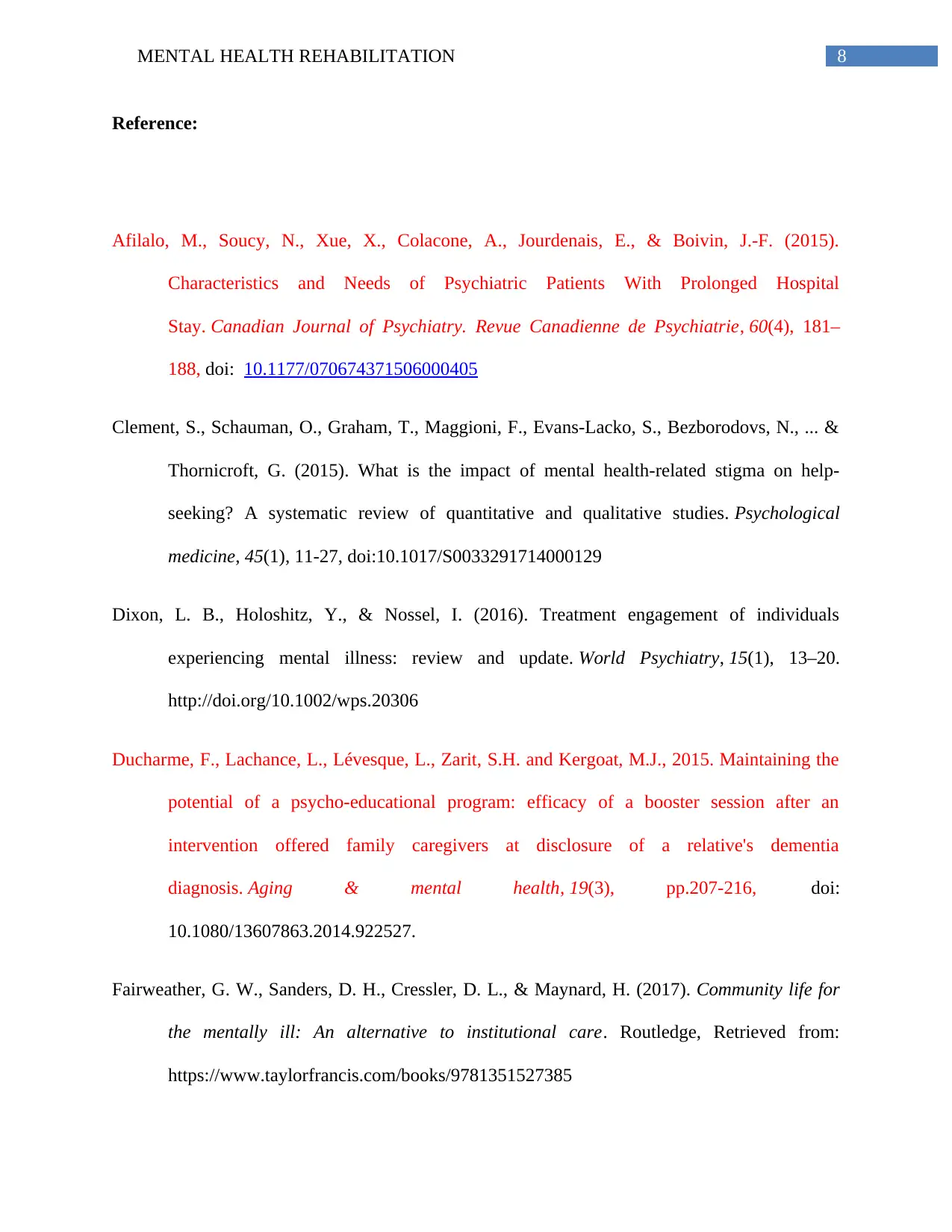
8MENTAL HEALTH REHABILITATION
Reference:
Afilalo, M., Soucy, N., Xue, X., Colacone, A., Jourdenais, E., & Boivin, J.-F. (2015).
Characteristics and Needs of Psychiatric Patients With Prolonged Hospital
Stay. Canadian Journal of Psychiatry. Revue Canadienne de Psychiatrie, 60(4), 181–
188, doi: 10.1177/070674371506000405
Clement, S., Schauman, O., Graham, T., Maggioni, F., Evans-Lacko, S., Bezborodovs, N., ... &
Thornicroft, G. (2015). What is the impact of mental health-related stigma on help-
seeking? A systematic review of quantitative and qualitative studies. Psychological
medicine, 45(1), 11-27, doi:10.1017/S0033291714000129
Dixon, L. B., Holoshitz, Y., & Nossel, I. (2016). Treatment engagement of individuals
experiencing mental illness: review and update. World Psychiatry, 15(1), 13–20.
http://doi.org/10.1002/wps.20306
Ducharme, F., Lachance, L., Lévesque, L., Zarit, S.H. and Kergoat, M.J., 2015. Maintaining the
potential of a psycho-educational program: efficacy of a booster session after an
intervention offered family caregivers at disclosure of a relative's dementia
diagnosis. Aging & mental health, 19(3), pp.207-216, doi:
10.1080/13607863.2014.922527.
Fairweather, G. W., Sanders, D. H., Cressler, D. L., & Maynard, H. (2017). Community life for
the mentally ill: An alternative to institutional care. Routledge, Retrieved from:
https://www.taylorfrancis.com/books/9781351527385
Reference:
Afilalo, M., Soucy, N., Xue, X., Colacone, A., Jourdenais, E., & Boivin, J.-F. (2015).
Characteristics and Needs of Psychiatric Patients With Prolonged Hospital
Stay. Canadian Journal of Psychiatry. Revue Canadienne de Psychiatrie, 60(4), 181–
188, doi: 10.1177/070674371506000405
Clement, S., Schauman, O., Graham, T., Maggioni, F., Evans-Lacko, S., Bezborodovs, N., ... &
Thornicroft, G. (2015). What is the impact of mental health-related stigma on help-
seeking? A systematic review of quantitative and qualitative studies. Psychological
medicine, 45(1), 11-27, doi:10.1017/S0033291714000129
Dixon, L. B., Holoshitz, Y., & Nossel, I. (2016). Treatment engagement of individuals
experiencing mental illness: review and update. World Psychiatry, 15(1), 13–20.
http://doi.org/10.1002/wps.20306
Ducharme, F., Lachance, L., Lévesque, L., Zarit, S.H. and Kergoat, M.J., 2015. Maintaining the
potential of a psycho-educational program: efficacy of a booster session after an
intervention offered family caregivers at disclosure of a relative's dementia
diagnosis. Aging & mental health, 19(3), pp.207-216, doi:
10.1080/13607863.2014.922527.
Fairweather, G. W., Sanders, D. H., Cressler, D. L., & Maynard, H. (2017). Community life for
the mentally ill: An alternative to institutional care. Routledge, Retrieved from:
https://www.taylorfrancis.com/books/9781351527385
⊘ This is a preview!⊘
Do you want full access?
Subscribe today to unlock all pages.

Trusted by 1+ million students worldwide
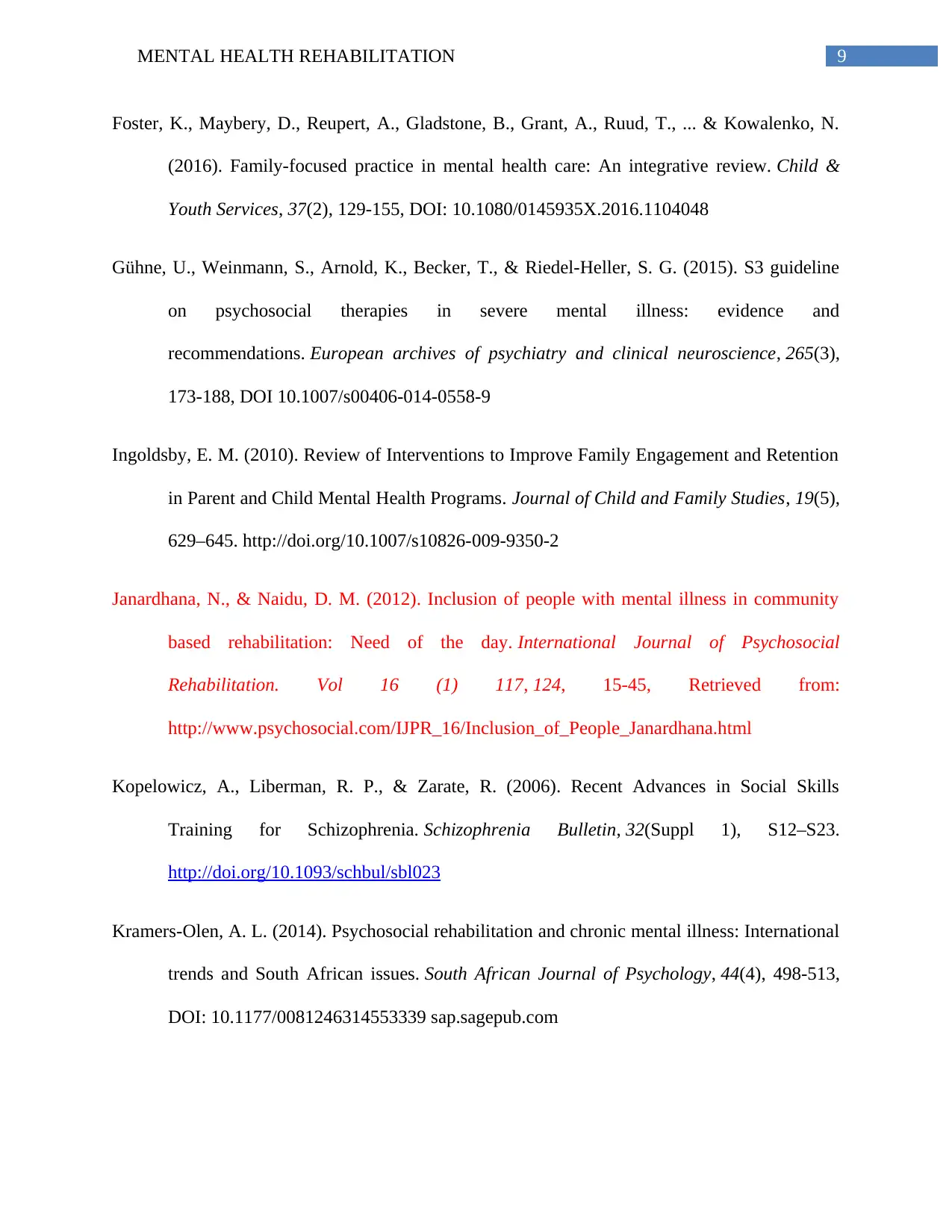
9MENTAL HEALTH REHABILITATION
Foster, K., Maybery, D., Reupert, A., Gladstone, B., Grant, A., Ruud, T., ... & Kowalenko, N.
(2016). Family-focused practice in mental health care: An integrative review. Child &
Youth Services, 37(2), 129-155, DOI: 10.1080/0145935X.2016.1104048
Gühne, U., Weinmann, S., Arnold, K., Becker, T., & Riedel-Heller, S. G. (2015). S3 guideline
on psychosocial therapies in severe mental illness: evidence and
recommendations. European archives of psychiatry and clinical neuroscience, 265(3),
173-188, DOI 10.1007/s00406-014-0558-9
Ingoldsby, E. M. (2010). Review of Interventions to Improve Family Engagement and Retention
in Parent and Child Mental Health Programs. Journal of Child and Family Studies, 19(5),
629–645. http://doi.org/10.1007/s10826-009-9350-2
Janardhana, N., & Naidu, D. M. (2012). Inclusion of people with mental illness in community
based rehabilitation: Need of the day. International Journal of Psychosocial
Rehabilitation. Vol 16 (1) 117, 124, 15-45, Retrieved from:
http://www.psychosocial.com/IJPR_16/Inclusion_of_People_Janardhana.html
Kopelowicz, A., Liberman, R. P., & Zarate, R. (2006). Recent Advances in Social Skills
Training for Schizophrenia. Schizophrenia Bulletin, 32(Suppl 1), S12–S23.
http://doi.org/10.1093/schbul/sbl023
Kramers-Olen, A. L. (2014). Psychosocial rehabilitation and chronic mental illness: International
trends and South African issues. South African Journal of Psychology, 44(4), 498-513,
DOI: 10.1177/0081246314553339 sap.sagepub.com
Foster, K., Maybery, D., Reupert, A., Gladstone, B., Grant, A., Ruud, T., ... & Kowalenko, N.
(2016). Family-focused practice in mental health care: An integrative review. Child &
Youth Services, 37(2), 129-155, DOI: 10.1080/0145935X.2016.1104048
Gühne, U., Weinmann, S., Arnold, K., Becker, T., & Riedel-Heller, S. G. (2015). S3 guideline
on psychosocial therapies in severe mental illness: evidence and
recommendations. European archives of psychiatry and clinical neuroscience, 265(3),
173-188, DOI 10.1007/s00406-014-0558-9
Ingoldsby, E. M. (2010). Review of Interventions to Improve Family Engagement and Retention
in Parent and Child Mental Health Programs. Journal of Child and Family Studies, 19(5),
629–645. http://doi.org/10.1007/s10826-009-9350-2
Janardhana, N., & Naidu, D. M. (2012). Inclusion of people with mental illness in community
based rehabilitation: Need of the day. International Journal of Psychosocial
Rehabilitation. Vol 16 (1) 117, 124, 15-45, Retrieved from:
http://www.psychosocial.com/IJPR_16/Inclusion_of_People_Janardhana.html
Kopelowicz, A., Liberman, R. P., & Zarate, R. (2006). Recent Advances in Social Skills
Training for Schizophrenia. Schizophrenia Bulletin, 32(Suppl 1), S12–S23.
http://doi.org/10.1093/schbul/sbl023
Kramers-Olen, A. L. (2014). Psychosocial rehabilitation and chronic mental illness: International
trends and South African issues. South African Journal of Psychology, 44(4), 498-513,
DOI: 10.1177/0081246314553339 sap.sagepub.com
Paraphrase This Document
Need a fresh take? Get an instant paraphrase of this document with our AI Paraphraser
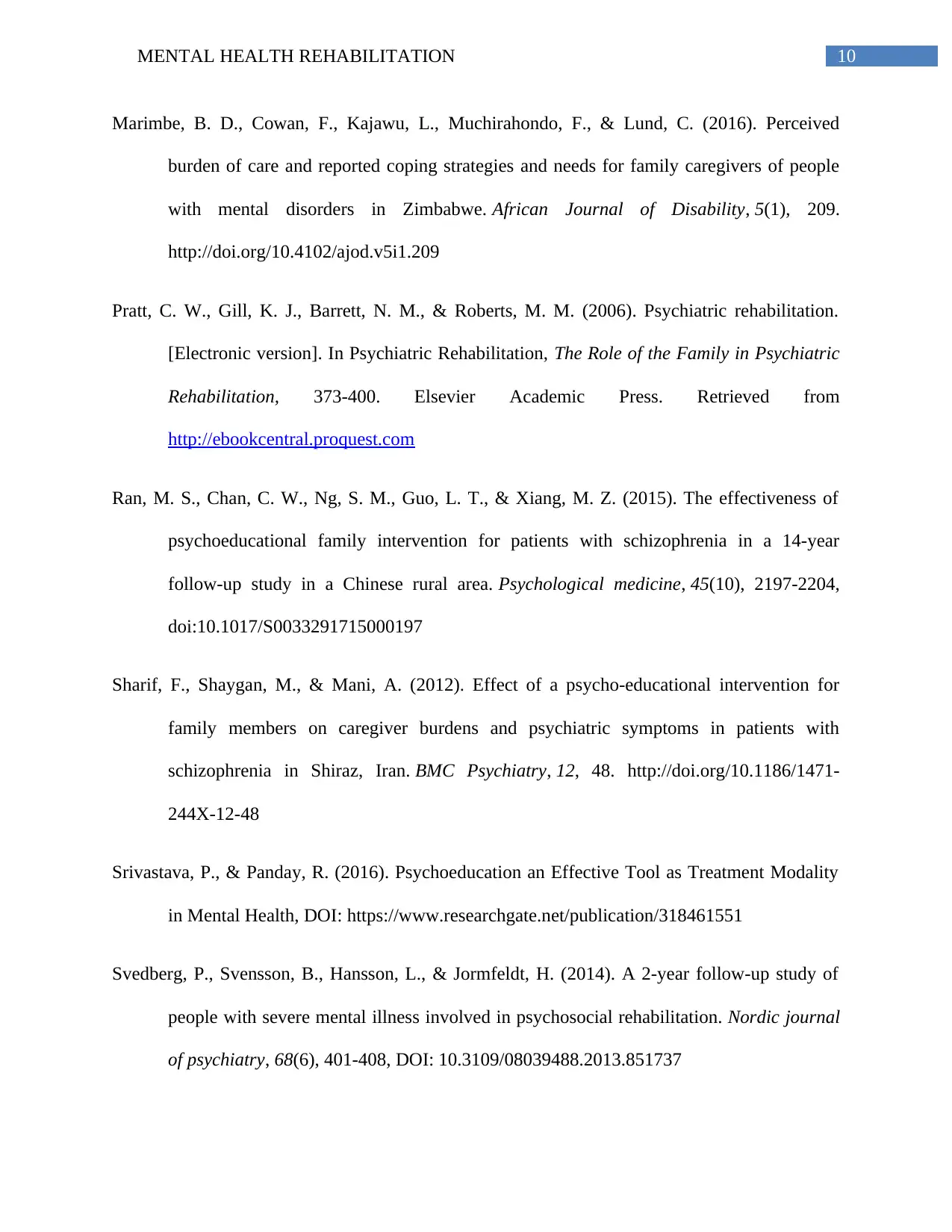
10MENTAL HEALTH REHABILITATION
Marimbe, B. D., Cowan, F., Kajawu, L., Muchirahondo, F., & Lund, C. (2016). Perceived
burden of care and reported coping strategies and needs for family caregivers of people
with mental disorders in Zimbabwe. African Journal of Disability, 5(1), 209.
http://doi.org/10.4102/ajod.v5i1.209
Pratt, C. W., Gill, K. J., Barrett, N. M., & Roberts, M. M. (2006). Psychiatric rehabilitation.
[Electronic version]. In Psychiatric Rehabilitation, The Role of the Family in Psychiatric
Rehabilitation, 373-400. Elsevier Academic Press. Retrieved from
http://ebookcentral.proquest.com
Ran, M. S., Chan, C. W., Ng, S. M., Guo, L. T., & Xiang, M. Z. (2015). The effectiveness of
psychoeducational family intervention for patients with schizophrenia in a 14-year
follow-up study in a Chinese rural area. Psychological medicine, 45(10), 2197-2204,
doi:10.1017/S0033291715000197
Sharif, F., Shaygan, M., & Mani, A. (2012). Effect of a psycho-educational intervention for
family members on caregiver burdens and psychiatric symptoms in patients with
schizophrenia in Shiraz, Iran. BMC Psychiatry, 12, 48. http://doi.org/10.1186/1471-
244X-12-48
Srivastava, P., & Panday, R. (2016). Psychoeducation an Effective Tool as Treatment Modality
in Mental Health, DOI: https://www.researchgate.net/publication/318461551
Svedberg, P., Svensson, B., Hansson, L., & Jormfeldt, H. (2014). A 2-year follow-up study of
people with severe mental illness involved in psychosocial rehabilitation. Nordic journal
of psychiatry, 68(6), 401-408, DOI: 10.3109/08039488.2013.851737
Marimbe, B. D., Cowan, F., Kajawu, L., Muchirahondo, F., & Lund, C. (2016). Perceived
burden of care and reported coping strategies and needs for family caregivers of people
with mental disorders in Zimbabwe. African Journal of Disability, 5(1), 209.
http://doi.org/10.4102/ajod.v5i1.209
Pratt, C. W., Gill, K. J., Barrett, N. M., & Roberts, M. M. (2006). Psychiatric rehabilitation.
[Electronic version]. In Psychiatric Rehabilitation, The Role of the Family in Psychiatric
Rehabilitation, 373-400. Elsevier Academic Press. Retrieved from
http://ebookcentral.proquest.com
Ran, M. S., Chan, C. W., Ng, S. M., Guo, L. T., & Xiang, M. Z. (2015). The effectiveness of
psychoeducational family intervention for patients with schizophrenia in a 14-year
follow-up study in a Chinese rural area. Psychological medicine, 45(10), 2197-2204,
doi:10.1017/S0033291715000197
Sharif, F., Shaygan, M., & Mani, A. (2012). Effect of a psycho-educational intervention for
family members on caregiver burdens and psychiatric symptoms in patients with
schizophrenia in Shiraz, Iran. BMC Psychiatry, 12, 48. http://doi.org/10.1186/1471-
244X-12-48
Srivastava, P., & Panday, R. (2016). Psychoeducation an Effective Tool as Treatment Modality
in Mental Health, DOI: https://www.researchgate.net/publication/318461551
Svedberg, P., Svensson, B., Hansson, L., & Jormfeldt, H. (2014). A 2-year follow-up study of
people with severe mental illness involved in psychosocial rehabilitation. Nordic journal
of psychiatry, 68(6), 401-408, DOI: 10.3109/08039488.2013.851737
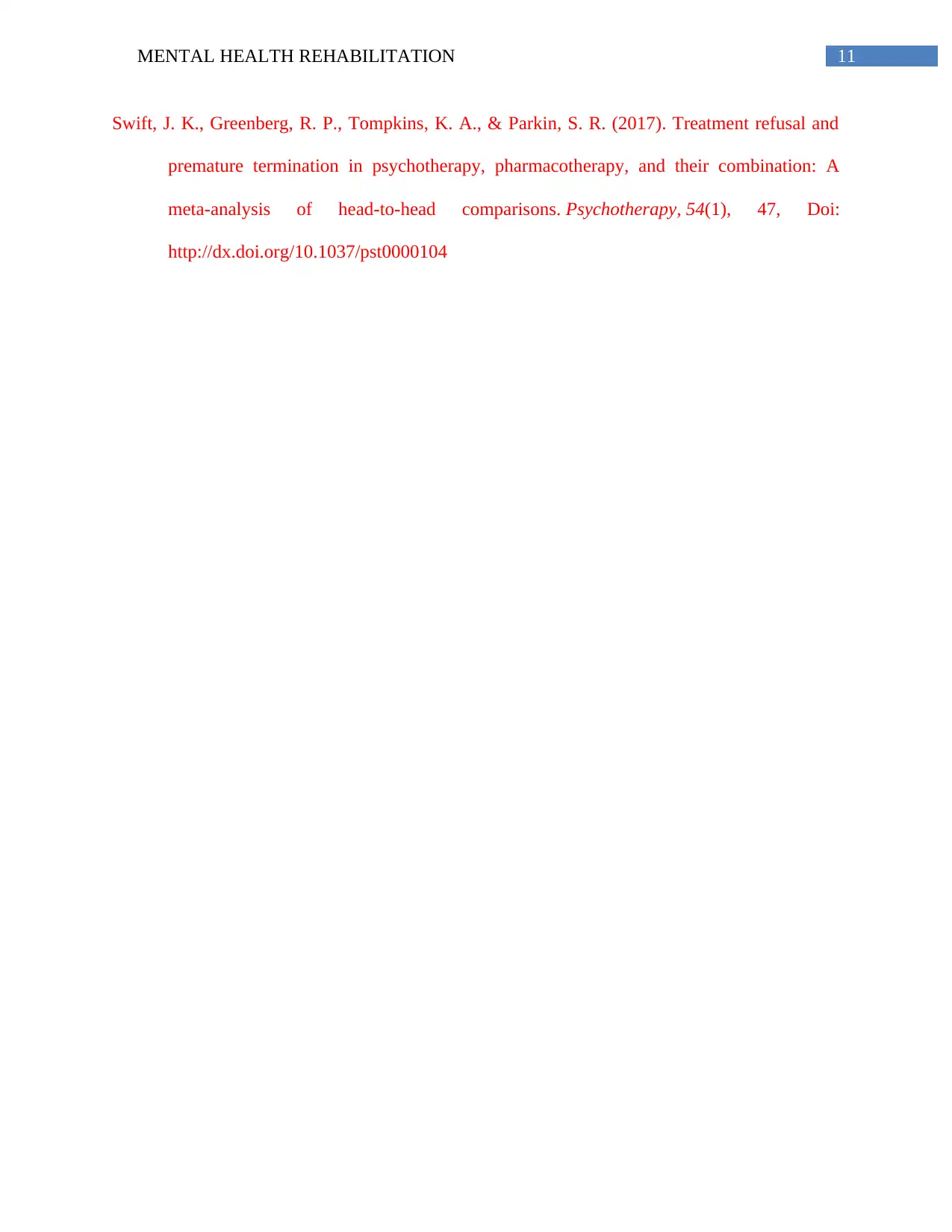
11MENTAL HEALTH REHABILITATION
Swift, J. K., Greenberg, R. P., Tompkins, K. A., & Parkin, S. R. (2017). Treatment refusal and
premature termination in psychotherapy, pharmacotherapy, and their combination: A
meta-analysis of head-to-head comparisons. Psychotherapy, 54(1), 47, Doi:
http://dx.doi.org/10.1037/pst0000104
Swift, J. K., Greenberg, R. P., Tompkins, K. A., & Parkin, S. R. (2017). Treatment refusal and
premature termination in psychotherapy, pharmacotherapy, and their combination: A
meta-analysis of head-to-head comparisons. Psychotherapy, 54(1), 47, Doi:
http://dx.doi.org/10.1037/pst0000104
⊘ This is a preview!⊘
Do you want full access?
Subscribe today to unlock all pages.

Trusted by 1+ million students worldwide
1 out of 12
Related Documents
Your All-in-One AI-Powered Toolkit for Academic Success.
+13062052269
info@desklib.com
Available 24*7 on WhatsApp / Email
![[object Object]](/_next/static/media/star-bottom.7253800d.svg)
Unlock your academic potential
Copyright © 2020–2026 A2Z Services. All Rights Reserved. Developed and managed by ZUCOL.





